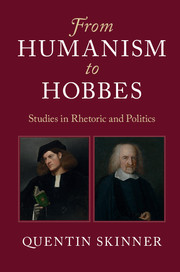Book contents
- Frontmatter
- Contents
- List of Illustrations
- Acknowledgements
- Conventions
- 1 Introduction
- 2 Classical Rhetoric and the Personation of the State
- 3 Machiavelli on Misunderstanding Princely Virtù
- 4 Judicial Rhetoric in The Merchant of Venice
- 5 Rhetorical Redescription and its Uses in Shakespeare
- 6 The Generation of John Milton at Cambridge
- 7 Rethinking Liberty in the English Revolution
- 8 Hobbes on Civil Conversation
- 9 Hobbes on Political Representation
- 10 Hobbes and the Humanist Frontispiece
- 11 Hobbes on Hereditary Right
- 12 Hobbes and the Concept of the State
- Bibliography
- Index
12 - Hobbes and the Concept of the State
Published online by Cambridge University Press: 16 January 2018
- Frontmatter
- Contents
- List of Illustrations
- Acknowledgements
- Conventions
- 1 Introduction
- 2 Classical Rhetoric and the Personation of the State
- 3 Machiavelli on Misunderstanding Princely Virtù
- 4 Judicial Rhetoric in The Merchant of Venice
- 5 Rhetorical Redescription and its Uses in Shakespeare
- 6 The Generation of John Milton at Cambridge
- 7 Rethinking Liberty in the English Revolution
- 8 Hobbes on Civil Conversation
- 9 Hobbes on Political Representation
- 10 Hobbes and the Humanist Frontispiece
- 11 Hobbes on Hereditary Right
- 12 Hobbes and the Concept of the State
- Bibliography
- Index
Summary
My aim in this concluding chapter is to situate Hobbes's theory of the state within a broader historical framework. As I argued in chapter 9, Hobbes's theory of political representation issues in the conclusion that to speak of a sovereign is to refer to a natural person (or body of persons) authorised to discharge the role of representing the person ‘by Fiction’ of the state. I now wish to extend my historical gaze and consider the origins and subsequent fortunes of this way of thinking about the state in Anglophone political thought.
I take as my point of departure the moment when, in the opening decades of the seventeenth century, we first begin to encounter widespread references to states, statecraft and the power of states. During this seminal period, the term state was generally used to describe the community or body politic over which rulers hold sway. This way of thinking was already implicit in the doctrine of the king's two bodies, the doctrine examined by Ernst Kantorowicz in his classic book of that name. Kantorowicz begins by quoting a verdict delivered by the English judges early in the reign of Elizabeth I. The case concerned the disposition of some royal lands, and the judges vindicated the rights of the Crown by referring to the doctrine that ‘the King has in him two Bodies’. One is his ‘Body natural’, which is subject ‘to all Infirmities that come by Nature or Accident’, and is thus no different from ‘the natural Bodies of other People’. But the other is described as his ‘Body politic’, which ‘cannot be seen or handled’, and is ‘constituted for the Direction of the People, and the Management of the public weal’.
From as early as the thirteenth century, according to Kantorowicz, the political bodies of kings were in turn held to constitute them as heads of the corpus politicum of their subjects, thereby producing what Kantorowicz describes as a fiction within a fiction. This further body politic was described in a variety of ways. Robert Mulcaster, translating Sir John Fortescue's mid-fifteenth-century treatise on the laws of England in 1567, makes Fortescue speak about the body of the realm. Edmund Plowden, writing a century after Fortescue in his Commentaries, refers instead to the body of the people.
- Type
- Chapter
- Information
- From Humanism to HobbesStudies in Rhetoric and Politics, pp. 341 - 383Publisher: Cambridge University PressPrint publication year: 2018



